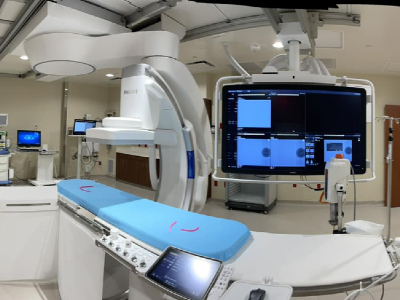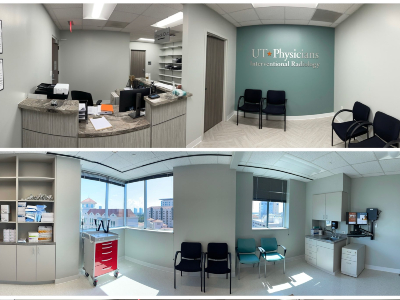Curriculum
Curriculum
We offer three (3) advanced IR residency positions each year through the NRMP match (Program Code: 2323416A0).
TMC IR includes rotations at UT Health institutions including Memorial Hermann Hospital in the Texas Medical Center and Lyndon B. Johnson General Hospital, as well as rotations at MD Anderson Cancer Center and Texas Children’s Hospital. Residents can also choose to pursue an elective rotation at Baylor St. Lukes.
Memorial Hermann allows for unsurpassed training in trauma, acute inpatient management, complex transplant and biliary work, interventional oncology, pediatric interventions, pain interventions, as well as close collaboration with our vascular, cardiology, and GI colleagues.
Training at LBJ adds to this portfolio by facilitating strong exposure to PAD, dialysis interventions, amongst many other areas including involvement with the pulmonary embolism response team.
Working at MD Anderson enables the development of expertise in cancer care and interventional oncology with exposure to countless ablation, TACE, and Y90 cases, as well as neurointerventional procedures and MSK interventions such as kyphoplasty. Given the patient population, trainees become familiar with portal vein embolization and working with our hepatobiliary surgeons and medical oncologists. There is also exposure to the sequela of advanced cancer-related complications including portal venous stenting, pulmonary embolism thrombectomy, and complex venous reconstructions.
Additional training at Texas Children’s Hospital and electives at Baylor St Luke’s and outpatient vein clinics, and the ability to utilize a flexible schedule component facilitates more targeted experience in areas of individual interest.
Program Structure
PGY 1: An independently-pursued internship year with training in internal medicine, surgery or a transitional year is accepted.
PGY 2-4: Diagnostic Radiology with 1 IR rotation per year
The first three years of training parallel the UT Health diagnostic radiology curriculum.
In brief, residents are assigned four-week blocks and will rotate through all diagnostic radiology subspecialties, with one month of IR per year. At the end of 36 months of rotations, IR residents are expected to pass the American Board of Radiology Core Exam (part 1).
PGY 5 and 6: Dedicated Interventional Radiology Curriculum
The last two years of training will be dedicated to mastering clinical and procedural skills of interventional radiology (10 months in PGY-5 with the exception of required mammography and nuclear medicine rotations, and 12 months in PGY-6).
The IR sections across all institutions are active clinical services, with several outpatient clinics, and inpatient services with participation by attending physicians, residents, medical students, physician assistants, and nurse coordinators. Trainees will be involved in all aspects of patient care including image interpretation, evaluation of new patients, procedures, inpatient and outpatient care, patient follow-up, and multidisciplinary boards.
Typical rotations include IR, vascular surgery or vascular imaging, and ICU. Additional time will be spent on rotations such as neurointerventional radiology, pediatric IR at Texas Children’s Hospital, and peripheral arterial disease exposure at LBJ and outpatient vein centers. Throughout the PGY-5 and PGY-6 years, residents will rotate in vascular imaging with the goal of completing the Registered Physician in Vascular Interpretation requirements.
At the end of residency, and upon successfully passing the ABR Core and Certifying exams, the resident will receive a dual certificate in interventional and diagnostic radiology.
Comprehensive Clinical Training
We offer comprehensive clinical exposure across UTHealth, MD Anderson Cancer Center, and Texas Children’s Hospital. As a result, trainees gain extensive experience and expertise in diagnostic and therapeutic procedures in multiple areas including:
Arterial Disease – thrombolysis, AVM interventions, PAD/CLI, aneurysm and pseudoaneurysm treatment (EVAR), endoleak embolization
Oncology – chemo and radioembolization, irreversible electroporation, percutaneous ablation (radiofrequency, microwave, cryo, ethanol)
Trauma – hemorrhage, solid organ injury management
GI Tract – TIPS, BATO/BRTO, endoscopic assisted biliary stone management, cholecystectomy tube, biliary dilation and stenting, portal vein recanalization, GI hemorrhage
GU Tract – nephrostomy, ureteral stents
Hemodialysis access – fistula and graft interventions and salvage
Lymphatic – Lymphangiography, thoracic duct embolization, liver and abdominal lymphatic embolization
Venous – Acute DVT thrombolysis and chronic DVT recanalization, reconstruction, and stenting; IVC filter placement and retrieval, including complex retrieval, superficial venous ablation, microphlebectomy, and sclerotherapy
Women’s Health – uterine artery embolization, fibroid treatment, pelvic congestion syndrome
Men’s Health – prostate artery embolization
Neurologic – acute stroke interventions, diagnostic cerebral angiography
Pain management – kyphoplasty and vertebroplasty, sacroplasty, bone ablation, and percutaneous sympathectomy
Clinical/Multidisciplinary – inpatient and outpatient consults, continuity of care, tumor boards, ICU, Vascular Ultrasound
Cutting-Edge Facilities
At TMC IR we boast state-of-the-art interventional radiology suites (including hybrid ORs) at our various clinical sites including Memorial Hermann Hospital, Lyndon B. Johnson General Hospital, MD Anderson Cancer Center, and Texas Children’s Hospital. Residents will also rotate in our brand-new outpatient clinics in the UT Physician’s building.
With full access to the resources and connections of the Texas Medical Center, including Johnson & Johnson’s Center for Device Innovation, and myriad research opportunities across our sites, TMC IR is well-positioned for physician-scientists, researchers, and entrepreneurs focused on innovation and device development.
Salary and Benefits
TMC IR offers residents a competitive salary and comprehensive benefits package.
Salary levels are based on the appropriate Post Graduate Year (PGY) in the appointed Residency Training Program, according to specialty or subspecialty Board requirements for certification.
A robust benefits package includes health, dental, life, disability and liability insurance, a resident book fund, support for conferences with dedicated time off, as well as paid vacation, sick leave, confidential counseling, tax deferred savings plans, parking allotment, and more.
Additional benefits include dedicated trainee lead during the PGY2-4 years as well as personalized lead (given at the start of the PGY5 year) and annual conference funding for presentations.

